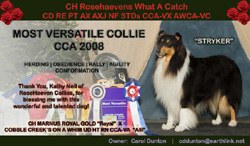| 
4. COL: What traits do you look for in a potential performance dog?
Carol Dunton: I look for a puppy/dog that is outgoing, temperamentally stable, structurally sound, and food motivated. If at all possible, I prefer a pup that has been puppy tested (by someone very knowledgeable in giving this testing), as this can give great insight into the strengths and weaknesses of the puppy. I prefer that the puppy be comfortable, outgoing and active at home as well as away from home. I also look for a pup that is not noise sensitive and has a quick recovery time if startled. If possible, I like the puppy to be inquisitive of things that it is initially unsure of. Of course, because of all of the demands of a performance dog (agility, obedience, herding), the dog needs to be sound structurally. I also like the dogs to be food motivated, although I believe that a dog’s level of food motivation can be conditioned to some degree. It is an added bonus to me if the puppy is motivated by toys, but that can be conditioned as well.
Jan Shields: Intelligence, biddability, herding instinct, ability to deal with pressure, heart, agileness, natural retrieving ability, sturdy body and they can’t be too wild.
Beth Elliot: I like a people-focused puppy, one that is willing to leave the rest to come and interact with you, especially with toy in mouth. I also like the naughty puppy, the one that is into playing with anything and everything, the first to start puppy playtime.
Sue Larson: I like a pup with a high energy level, hopefully one that likes to chase and fetch things, one that's food oriented, and one that gives you eye contact.
Vicki Loucks: I like an alpha type dog, lots of ball or toy drive, I want a puppy to tug and like food. I usually pick the busiest puppy and, of course, the hardest to live with too, but OOHHH so much fun.
Marilyn Clayton: Good health with a pedigree strong in longevity; I want an athletic body type; a dog strong in drive but with a stronger desire to please (so the drive can be controlled) and a good dash of independence and confidence. I want balanced structure with a strong front (esp. good length of upper arm); and a strong topline with a loin that is flexible but not so long it is weak.
Shelley Bergstraser: I want a puppy who is enthusiastic and BUSY, BUSY, BUSY, able to figure things out and find their own way out of tight spots. I like to watch litters of puppies over the weeks that they are really cognitive. I have usually chosen the "naughtiest" puppy or puppies for what I want. I think when they are overly quiet and cautious they can be very smart, but often don't have the drive I need to do everything. These puppies can be a little hard to live with as babies -- just meaning they are very busy and you have to stay on top of them and watch them, but they are amazing adults that often can still run agility, herd and do advanced obedience into their double digits! I also ALWAYS look for physical soundness. I think that a dog who FEELS good running, jumping and turning, is a way more athletic type of dog, even mentally as an adult.
Dr. Deanna Levenhagen: First, I want to have an honest and open discussion with the breeder. I want to know the good and the bad in the pedigree (health, personalities, etc.), why they are breeding, why they chose to breed this particular sire and dam. I don’t put too much weight on what the parents may or may not have done. Just because the parent has a certain title, it does not guarantee that its offspring will also earn similar titles. In the same vein, just because a parent doesn’t have a title, doesn’t mean that its offspring isn’t capable of successfully competing in a certain venue. To me, the titles on a dog are a function of what the owners wanted or had time, desire, or money to train and not necessarily a function of what the offspring may be capable of. Secondly, I look for good structure and temperament and a personality. A dog may have a great temperament, drive, or work ethic, but if it isn’t structurally sound, it won’t hold up to the rigors required to compete in the performance venues. A performance home is not a “pet home.” A performance home is a show home. A lot will be asked of the dog physically and mentally. As such, just because it is an active puppy, doesn’t make it a good performance dog. You need to look beyond the puppy’s activity level. You need to evaluate how the dog thinks, solves problems, interacts with its littermates, reacts to its surroundings, etc. None of the above will guarantee success, but it will provide clues as to the possibilities. Oftentimes, “puppy tests” can provide valuable information. Additionally, I like to evaluate how the puppy’s style and attitude meshes with my training style. Some dogs are very soft, while others are very head strong and stubborn and take a firmer hand. Each can be successful, but require different training styles. If the wrong style is used on the wrong dog, the dog can either shut down or refuse to work with you. In either case, the dog will rarely reach its potential (unless the trainer is willing to change their style). So, ultimately, for a performance dog, I look for a good all-around package.
> go to Question #5
> Back to Question #3 |